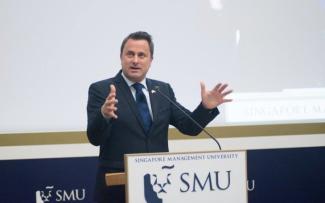
In the modern high-tech world, small countries have an edge, said Luxembourg’s Prime Minister Mr Xavier Bettel. "Luxembourg, similar to Singapore in Asia, is emerging as a digital hub in Europe. It's small, agile enough to perceive change and to react quickly. Where others think, analyse, analyse and think and analyse and think and do a study and counter-study, we decide. That makes the difference," he asserted.
He was speaking on what political leadership means in the digital age at the fifth instalment of SMU’s Presidential Distinguished Lecturer Series of 2016. The lecture was attended by 300 tertiary students, diplomats and government officers, including Mrs Josephine Teo, Singapore Senior Minister of State, Prime Minister's Office, Ministry of Foreign Affairs & Ministry of Transport; and Ms Sim Ann, Singapore Senior Minister of State, Ministry of Culture, Community and Youth & Ministry of Trade and Industry.

Prime Minister of Luxembourg HE Xavier Bettel (centre) with (left to right) Ambassador Jaya Ratnam, Singapore’s Ambassador to the Grand Duchy of Luxembourg; Ambassador of Luxembourg to Singapore HE Robert Lauer; Singapore Senior Minister of State, Prime Minister's Office, Ministry of Foreign Affairs & Ministry of Transport Mrs Josephine Teo; Singapore Senior Minister of State, Ministry of Culture, Community and Youth & Ministry of Trade and Industry Ms Sim Ann; Honorary Consul of Luxembourg in Singapore Ms Michelle Liem; SMU President Prof Arnoud De Meyer.
As the leader of a small country, PM Bettel sees technology as a force of tremendous opportunity in areas such as financial technology, logistics, satellites and space science. But the highly disruptive nature of 21st century technologies also requires governments to demonstrate political leadership by constantly anticipating and adapting to technological shifts, and to put in place laws and policies to keep in check any consequences.
He noted that far-sighted political vision has enabled Luxembourg and Singapore to thrive next to far larger neighbours, while staying nimble and having coherent policies that keep the effects of technology positive and the country competitive. But while a country must never forget its culture and values, trying to preserve the status quo is not the way to keep one’s identity. He said: “It’s important to keep your roots, your culture and your language, and it’s important to know where you come from, but also to know where you want to go. We want to stay what we are, but that doesn’t mean we want to stay where we are, because this would be the end of a country.”

“We want to push innovation where it's needed while managing the temporary trade-offs,” said Luxembourg's Prime Minister Mr Xavier Bettel.
He said that the ride-hailing firm Uber will create jobs in Luxembourg. However, before they start operations, his government wants to put in place a framework to ensure its drivers adhere to social obligations such as paying taxes and social insurance, and contribute to state funds for retirement pensions.
He also suggested that social media platforms have made instantaneous global communication possible. However, the speed at which information travels today has made fact and fiction harder to differentiate, and there is now greater expectation for politicians to give oversimplified solutions to complicated problems. This has given rise to populists who, "for the difficult questions, will have the easiest answers", he said. "Even if it's not possible, even if it's a lie, it sounds good in your ear, at least for five minutes," which might be long enough to get your vote, he added. This is why there is a greater need than ever for governments to inculcate in its citizens the "critical spirit" of discerning whether information on social media should be trusted, said Mr Bettel.
"It's very important to educate people, especially the young, on technology and on information, to have this critical spirit to tell the difference between what is right and wrong," he added.
Far-sighted political vision, he said, has enabled Luxembourg and Singapore to thrive next to far larger neighbours, while staying nimble and having coherent policies that keep the effects of technology positive and the country competitive. Yet while a country must never forget its culture and values, trying to preserve the status quo is not the best way to keep one's identity.

“SMU has invested heavily in research and education on the future smart nation, a theme well-known here in Singapore. For example, from the next academic year, we will strengthen our academic curriculum in three schools to contribute to the future-proofing of Singapore,” said SMU President Prof Arnoud De Meyer in his Welcome Address.
In the Question and Answer session moderated by Prof De Meyer, members of the audience who posed questions included the His Excellency Usen Suleimen, Ambassador of Kazakhstan, amongst others. PM Bettel answered wide-ranging questions on whether fintech was a threat to Luxembourg’s role as a financial hub, on religious tensions in Europe, Luxembourg’s policies on the regulation of ‘big data’ and US-Russian relations.

His Excellency Usen Suleimen, Ambassador of Kazakhstan, posing a question to Mr Bettel.

Mr Bettel receiving a token of appreciation from Prof De Meyer, on behalf of SMU.

Two SMU undergraduates take a “wefie” with Mr Bettel at the reception after the lecture.
Watch the video here.
See more photos here.